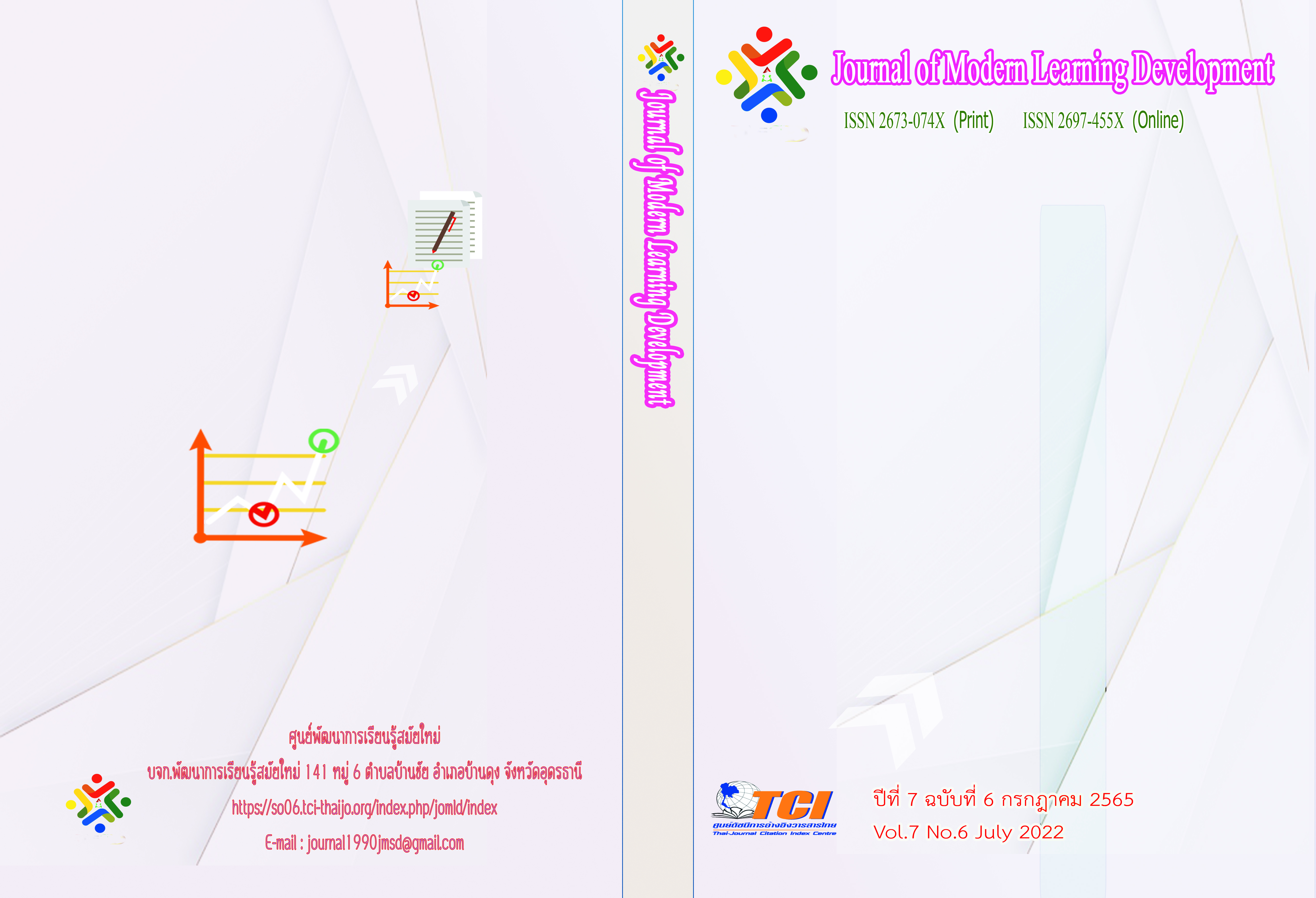แนวทางการบริหารการศึกษาตามหลักพละ 4 ของสถานศึกษา สังกัดสำนักบริหารงานการศึกษาพิเศษ ในจังหวัดขอนแก่น
Main Article Content
บทคัดย่อ
การวิจัยครั้งนี้มีวัตถุประสงค์ 1) เพื่อศึกษาการบริหารการศึกษาตามหลักพละ 4 ของสถานศึกษา สังกัดสำนักบริหารงานการศึกษาพิเศษ ในจังหวัดขอนแก่น 2) เพื่อเสนอแนวทาง การบริหารการศึกษาตามหลักพละ 4 ของสถานศึกษา สังกัดสำนักบริหารงานการศึกษาพิเศษ ในจังหวัดขอนแก่น ผู้วิจัยกำหนดกลุ่มตัวอย่าง รวมทั้งสิ้น 194 คน กลุ่มผู้ให้ข้อมูลหลักจากการสัมภาษณ์ 3 คน เครื่องมือที่ใช้ในการวิจัยคือ แบบสอบถามและแบบสัมภาษณ์ ค่าความเชื่อมั่นแบบสอบถามทั้งฉบับ เท่ากับ 0.92 สถิติที่ใช้ในการวิเคราะห์ข้อมูล ได้แก่ ค่าความถี่ ค่าร้อยละ ค่าเฉลี่ย และค่าส่วนเบี่ยงเบนมาตรฐาน
ผลการวิจัยพบว่า: 1) การบริหารการศึกษาตามหลักพละ 4 ของสถานศึกษา สังกัดสำนักบริหารงานการศึกษาพิเศษ ในจังหวัดขอนแก่น พบว่า โดยภาพรวม มีระดับการปฏิบัติเฉลี่ยอยู่ในระดับมาก และเมื่อจำแนกเป็นรายด้าน พบว่า ด้านที่มีค่าเฉลี่ยสูงสุด คือ ด้านการบริหารงานทั่วไปตามหลักพละ 4 มีการปฏิบัติอยู่ในระดับมาก รองลงมาคือ ด้านการบริหารวิชาการ ตามหลักพละ 4 มีการปฏิบัติอยู่ในระดับมาก ส่วนด้านที่เหลือ 2 ด้าน คือ ด้านการบริหารงานงบประมาณตามหลักพละ 4 และด้านการบริหารงานบุคคลตามหลักพละ 4 มีการปฏิบัติอยู่ในระดับมาก โดยมีค่าเฉลี่ยและส่วนเบี่ยงเบนมาตรฐานเท่ากัน
2) แนวทางการบริหารการศึกษาตามหลักพละ 4 ของสถานศึกษาสังกัดสำนักบริหารงานการศึกษาพิเศษ ในจังหวัดขอนแก่น ดังนี้ 1) การบริหารวิชาการตามหลักพละ 4 ผู้บริหารควรยึด “ปัญญาพละ” คือ กำลังของความรู้ ความสามารถในการบริหารงานวิชาการเป็นหลักในการดำเนินงาน 2) การบริหารงานงบประมาณตามหลักพละ 4 ผู้บริหารควรยึด “ปัญญาพละ” คือ กำลังแห่งความรู้ ความสามารถและความแม่นยำเกี่ยวกับงานการเงินเป็นหลัก อีกประการคือ “อนวัชชพละ” คือ กำลังของการดำเนินงานด้วยความซื่อสัตย์ สุจริตของผู้ที่ได้รับมอบหมายให้ปฏิบัติหน้าที่เจ้าหน้าที่การเงิน 3) การบริหารงานบุคคลตามหลักพละ 4 ผู้บริหารควรยึด “ปัญญาพละ” เป็นหลักในการบริหารงานบุคคล อีกประการคือ “สังคหพละ” คือกำลังของการสงเคราะห์ และมีมนุษยสัมพันธ์ที่ดีต่อผู้ใต้บังคับบัญชา 4) การบริหารงานทั่วไปตามหลักพละ 4 ผู้บริหารควรยึด “ปัญญาพละ” เป็นหลัก และอีก 2 ประการคือ “วิริยพละ” และ “สังคหพละ”
Article Details
เอกสารอ้างอิง
กระทรวงศึกษาธิการ. (2550). กฎกระทรวงกำหนดหลักเกณฑ์และวิธีการกระจายอำนาจการบริหาร
และการจัดการศึกษา. กรุงเทพมหานคร: โรงพิมพ์ชุมชนสหกรณ์การเกษตรแห่งประเทศไทย.
กระทรวงศึกษาธิการ. (2545). พระราชบัญญัติการศึกษาแห่งชาติ พ.ศ. ๒๕๔๒ แก้ไขเพิ่มเติม (ฉบับที่ 2) พ.ศ. 2545
และ (ฉบับที่ 3) พ.ศ. 2553. กรุงเทพมหานคร: โรงพิมพ์องค์การรับส่งสินค้าและพัสดุภัณฑ์.
พระธรรมโกศาจารย์ (ประยูร ธมฺมจิตฺโต). (2549). พุทธวิธีบริหาร. กรุงเทพมหานคร: มหาจุฬาลงกรณราชวิทยาลัย.
พระมหาธฤติ วิโรจโน (รุ่งชัยวิฑูร). (2552). การบริหารงานบุคคลตามหลักธรรมทางพระพุทธศาสนา ของ
โรงเรียนในเขตธนบุรี สังกัดกรุงเทพมหานคร. วิทยานิพนธ์พุทธศาสตรมหาบัณฑิต. บัณฑิต
วิทยาลัย: มหาวิทยาลัยมหาจุฬาลงกรณราชวิทยาลัย.
พระพรชัย สุกธมฺโม (ประสิทธิ์ สุขสันต์). (2554). ผู้นำเชิงพุทธกับการจัดการอคติ = Buddhist Leaders and
Bias Management. บทความประชุมวิชาการทางพระพุทธศาสนานานาชาติ ครั้งที่ 8
เนื่องในวันวิสาขบูชา วันสำคัญสากลของโลก 12 - 14 พฤษภาคม 2554 ประเทศไทย. รวบรวม
จัดพิมพ์โดย ผศ.ดร.พระมหาหรรษา ธมฺมหาโส. กรุงเทพมหานคร: 21 เซ็นจูรี่, 43-48.
พระพรหมคุณาภรณ์ (ป.อ. ปยุตฺโต). (2550). พจนานุกรมพุทธศาสตร์ ฉบับประมวลธรรม. (พิมพ์ครั้งที่ 15).
กรุงเทพมหานคร: สำนักพิมพ์จันทร์เพ็ญ.
วิชญาภา เมธีวรฉัตร. (2555). การพัฒนาทรัพยากรมนุษย์ตามหลักอิทธิบาท 4 : กรณีศึกษาโรงเรียนคีรีวงศ์
วิทยา จ.นครสวรรค์. วิทยานิพนธ์พุทธศาสตรมหาบัณฑิต สาขาวิชารัฐประศาสนศาสตร์. บัณฑิต
วิทยาลัย: มหาวิทยาลัยมหาจุฬาลงกรณราชวิทยาลัย.
วีรณัฐ โรจนประภา. (2559). การนำหลักพุทธธรรมมาประยุกต์ใช้ในการสร้างสังคมแห่งสัมมาปัญญา
ในประเทศไทย. วารสารวิชาการ บัณฑิตวิทยาลัยสวนดุสิต. 12 (3), 217-231.
สำนักบริหารงานการศึกษาพิเศษ. (2556). แนวทางการนิเทศการจัดการศึกษาของสถานศึกษา สังกัดสำนัก
บริหารงานการศึกษาพิเศษ. กรุงเทพมหานคร: สำนักงานคณะกรรมการการศึกษาขั้นพื้นฐาน กระทรวงศึกษาธิการ.


